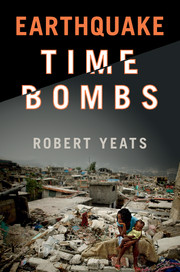Book contents
- Frontmatter
- Contents
- Acknowledgments
- Why this book?
- PART I EARTHQUAKES, DEEP TIME, AND THE POPULATION EXPLOSION
- 1 Plate tectonics and why we have earthquakes
- 2 An earthquake primer
- 3 Deep time
- 4 When's the next Big One?
- 5 Population explosion and increased earthquake risk to megacities
- PART II EARTHQUAKE TIME BOMBS
- PART III SUMMARY AND RECOMMENDATIONS
- References
- Index
3 - Deep time
from PART I - EARTHQUAKES, DEEP TIME, AND THE POPULATION EXPLOSION
Published online by Cambridge University Press: 05 November 2015
- Frontmatter
- Contents
- Acknowledgments
- Why this book?
- PART I EARTHQUAKES, DEEP TIME, AND THE POPULATION EXPLOSION
- 1 Plate tectonics and why we have earthquakes
- 2 An earthquake primer
- 3 Deep time
- 4 When's the next Big One?
- 5 Population explosion and increased earthquake risk to megacities
- PART II EARTHQUAKE TIME BOMBS
- PART III SUMMARY AND RECOMMENDATIONS
- References
- Index
Summary
Chuck Denham and I were sitting in a bar in Mexico City at 9:30 a.m., planning a climb of Mt. Popocatépetl, the active volcano that looms over the eastern edge of the metropolis. Just as I was sipping my beer, the room started to sway, and glasses behind the bar started to tinkle and break, bringing forth a lot of swearing in Spanish. OMG, I said to Chuck, we're having an earthquake!
We then did a stupid thing and ran outside; stupid, because if bricks had started falling off the building, we could have been struck and killed. Once we were outside, it was hard to remain standing in the middle of the street. Parked cars were rocking back and forth, and buildings were clapping together like giant hands; fortunately for us, not shedding bricks onto the sidewalk. A siren wailed in the distance.
After what seemed forever, the shaking stopped and the earthquake was over. I looked at my watch and saw that the entire shaking episode had taken only 15 seconds! I could have sworn it was several times that long – more than a minute.
On March 11, 2011, my Oregon State University colleague, Chris Goldfinger, was in a conference north of Tokyo, Japan, discussing earthquakes, when the meeting room began to shake. Someone took a video of the confusion that descended upon the assembled scientists, again showing people rushing outside. In this case, the shaking kept going and going. When it stopped, Chris estimated that strong shaking had lasted five minutes, although other estimates were a minute or two less. But it seemed to people at the conference that the shaking would never stop.
The lesson in both cases was our perception of time, which seemed to almost stand still. The world could have been crashing around us, and we might lose our lives. To us, the entire experience was in slow motion, like an instant replay of football on television. In our minds, seconds became minutes.
- Type
- Chapter
- Information
- Earthquake Time Bombs , pp. 34 - 42Publisher: Cambridge University PressPrint publication year: 2015



